June marked the 25th Anniversary of Gramercy! Thank you to our valued investors, trusted business partners and team members without whom this milestone could not have been reached. We are excited for the opportunities we see ahead, and look forward to continuing to deliver upon our mission to have a positive impact on the well-being of our clients, portfolio investments (and their communities) and our team members.
Contents
Market Overview
Macro Review
U.S. and UK inflation moderated and triggered a strong rally last week. Stronger U.S. retail sales and Empire State manufacturing supported the notion of U.S. exceptionalism, but that sentiment was short-lived as initial jobless claims rose and house price data fell. Both U.S. and Eurozone government bonds are now pricing in 100bps of cuts in 2024. The ECB’s Villeroy said halting the rate hiking cycle was fully justified, but Fedspeakers cited risks to credibility if they declared victory over inflation too soon. There are still some central banks who have been late to the game and the Bank of Japan’s Governor highlighted that negative rates and YCC may not be a Central Bank strategy for much longer. Elsewhere, President Biden and Premier Xi held what was a tightly scripted diplomatic encounter, which did not lead to any surprises. Crude oil traded down 2-3% over the week due to higher U.S. inventories, which also did not lead to any shocks. Going back to the weaker U.S. CPI release, it is important to take stock of the volatility. We witnessed the largest one-day move in DXY (U.S. dollar index) since November 2022, allowing EMFX to rally substantially. Unsurprisingly, EM local currency bonds are set to record the strongest monthly performance this year. The risk-on momentum was equally visible in USD fixed income as EM sovereign investment grade returns this month are the strongest since July 2020 and it is likely to be the second-best month for U.S. high yield this year. A special mention also goes to the S&P 500 which is up 7.5% this month which stands to be the best monthly performance since November 2020.
EM Credit Update
Emerging markets sovereign credit (cash bonds) ended the week up 1.2% with credit spreads 1bp tighter. U.S. Treasuries rallied 21-31bps over the past week. Sovereign outperformers were Venezuela, Tunisia and Ghana, while Sri Lanka, Bolivia and Ethiopia underperformed. The focus of the week was very much on the return of AT1 issuance in developed markets, but also in EM as subordinated financial issuance increases. The market did breathe a sigh of relief as Speaker Johnson also averted a U.S. shutdown, despite Moody’s cutting the U.S. credit outlook to negative in the previous week.
The Week Ahead
Argentina heads to the polls for the second round of the Presidential Election over the weekend. After an intense first round, the Presidential runoff pits Economy Minister, Sergio Massa, against one of the most populist voices in modern time, Javier Milei. Within Europe, the Dutch election is set to be held on Wednesday and remains equally divisive. Elsewhere, Japan’s Central Bank Governor has already hinted that negative rates and YCC may be scrapped, and the inflation report for October could validate that notion. Some focus could also be on the UK’s Autumn Statement given fiscal concerns and the sensitivity to the bond market. Within EM, China is likely to keep the one-year and five-year loan prime rates unchanged at 3.45% and 4.20%, respectively. Other key EM interest rate decisions are due from Hungary (12.25%), Indonesia (6.0%), Kazakhstan (16%), Nigeria (18.75%), South Africa (8.25%), Sri Lanka (10%) and Turkey (35%). We can also expect some focus on FOMC minutes, although the market has taken the lead with more than 100bps of cuts priced in through to the end of 2024.
Highlights from emerging markets discussed below: Argentina will choose between divergent economic visions in a tight presidential runoff on Sunday, Pakistan reaches staff-level agreement with the IMF, unlocks $700mm tranche and Ethiopia announces interim suspension of bilateral debt payments.
Fixed Income
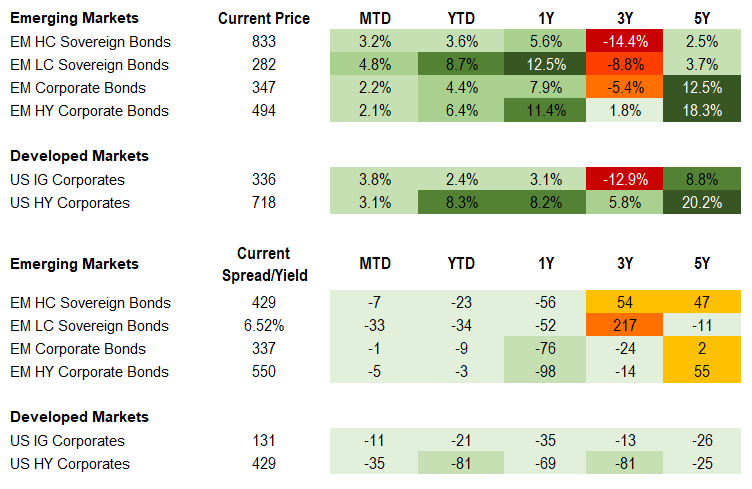
Equities
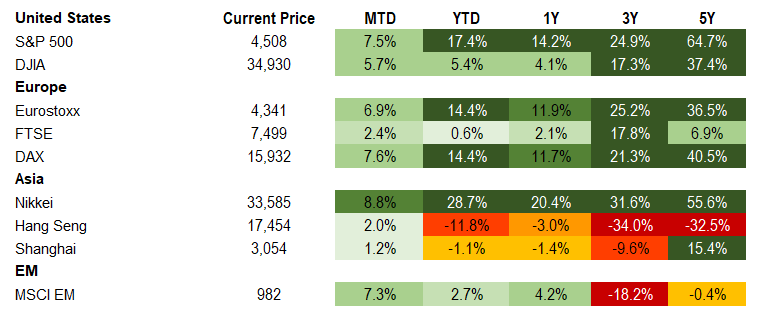
Commodities

Source for data tables: Bloomberg, JPMorgan, Gramercy. EM Fixed Income is represented by the following JPMorgan Indicies: EMBI Global, GBI-EM Global Diversified, CEMBI Broad Diversified and CEMBI Broad High Yield. DM Fixed Income is represented by the JPMorgan JULI Total Return Index and Domestic High Yield Index. Fixed Income, Equity and Commodity data is as of November 17, 2023 (mid-afternoon).
Emerging Markets Weekly Highlights
Argentina will choose between divergent economic visions in a tight presidential runoff on Sunday
Event: Argentine voters will elect their next President on Sunday, November 19th in what appears likely to be a very tight runoff between current Economy Minister Sergio Massa and libertarian Javier Milei. Mr. Massa won the first round on October 22nd with 37% of the vote versus his opponent’s 30%, but Mr. Milei was subsequently endorsed by center-right Patricia Bullrich who came in third in the first round with 24% of the vote.
Gramercy commentary: The two candidates have offered quite different visions about Argentina’s economic policy management going forward and how to steer the country out of its main challenges dominated by high inflation, unsustainable fiscal spending, and foreign liquidity pressures, among others. Current Economy Minister Massa represents the “status quo”, but also is likely to offer a great degree of governability from a supportive congress and a “national unity” administration. Massa’s trademark policy pragmatism could also help bring about macroeconomic stabilization and improved cooperation with the IMF. On the other side, Mr. Milei’s main offer to both voters and investors alike is a radical departure from the economic management of the past, including proposed dollarization of the economy and abolishment of the Central Bank. Uncertainty prevails about his ability to implement policy and his potential economic team, but Mr. Milei enjoys the support of market-friendly figures such as former President Macri. Regardless of which candidate prevails on Sunday, the harsh macroeconomic challenges facing the new administration will likely incentivize it to adopt a general market-friendly policy approach relative to the recent past, in our view.
Pakistan reaches staff-level agreement with the IMF, unlocks $700mm tranche
Event: Pakistan’s caretaker government and the IMF reached a staff-level agreement on the first review under Pakistan’s $3bn Stand-by Arrangement (SBA), subject to approval by the IMF’s Executive Board. Upon approval, Pakistan will have access to around $700 million, bringing total disbursements under the program to almost $1.9 billion.
Gramercy commentary: Under the IMF program, Pakistan’s authorities have committed to market-friendly measures such as fiscal consolidation, cost-reducing reforms in the energy sector, a complete return to a market-determined exchange rate, and reforming state-owned enterprise (SOE), among others. Not surprisingly, markets have welcomed this reform momentum, reflected by close to a 60% YTD return by Pakistan’s sovereign bonds. The successful completion of the IMF review adds an additional constructive element to the story as it is likely to catalyze further external financing from bilateral and other multilateral sources. Beyond cooperation with the IMF and general macroeconomic stabilization, investors are focused on the upcoming general elections scheduled in February 2024 that will determine Pakistan’s economic trajectory and perceived ability to repay sovereign debt obligations going forward.
Ethiopia announces interim suspension of bilateral debt payments
Event: Official creditors have granted a suspension on bilateral debt service payments to Ethiopia and the authorities indicated they may also seek a restructuring of their $1bn sovereign Eurobond due in December 2024. The agreement on debt service suspension with the Official Creditor Committee comes on the heels of a separate, but similar, agreement with China.
Gramercy commentary: It is not clear yet what kind of strategy the government will adopt in relation to its only sovereign bond outstanding. However, a reprofiling proposal will likely follow given the authorities’ stated objective to secure “appropriate breathing space for the periods 2023 and 2024” and focus on creditor burden-sharing as highlighted by IMF’s concerns about Zambia’s recent deal with bondholders. In terms of sequencing, negotiations with private bondholders are unlikely before a formal agreement with official sector creditors is reached. Such an agreement could also pave the way for a potential new IMF program, possibly in the first half of 2024, that could unlock additional fresh foreign financing for the Ethiopian economy which has been struggling since a civil war that raged from 2020 until 2022.
Emerging Markets Technicals
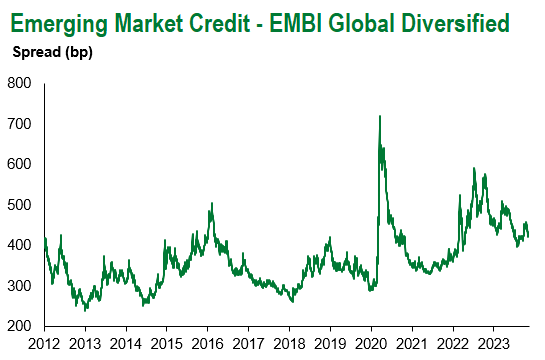
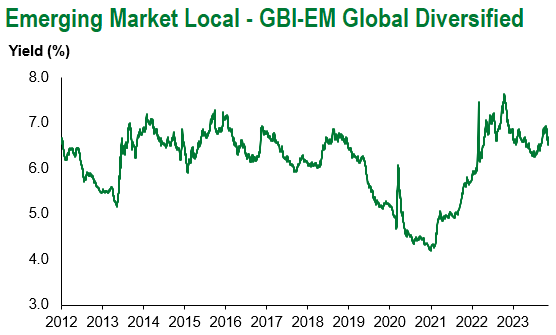
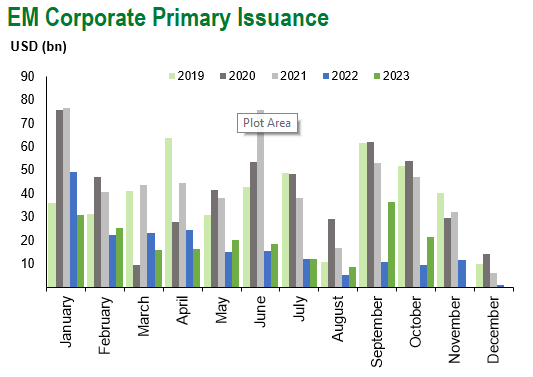
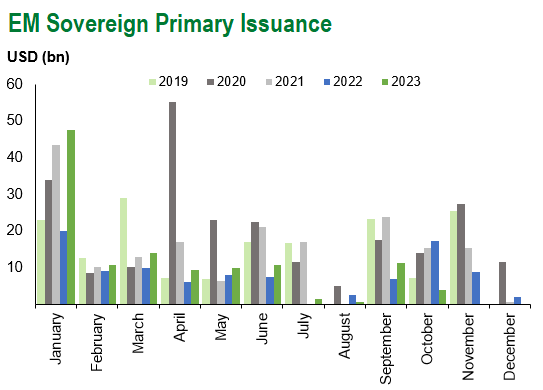
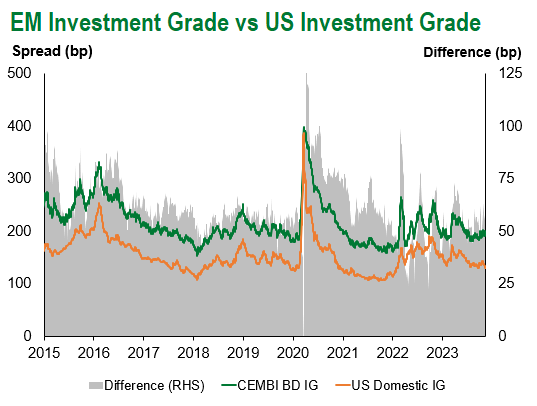
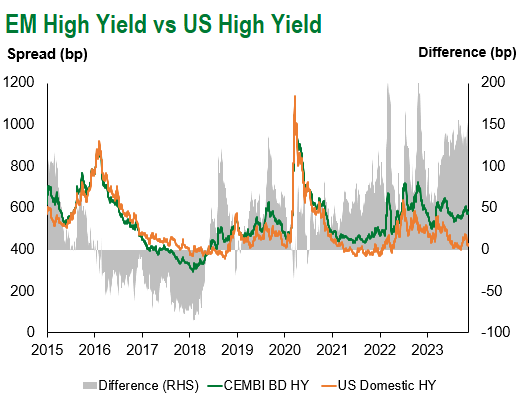
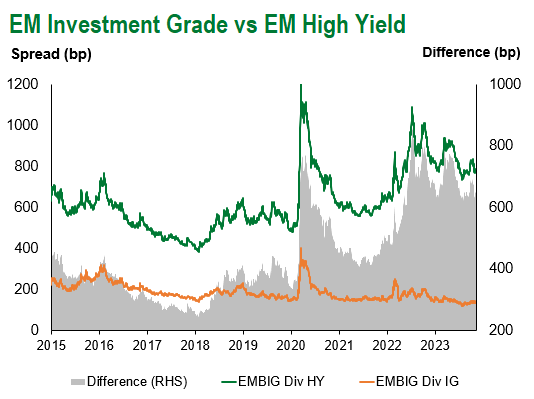
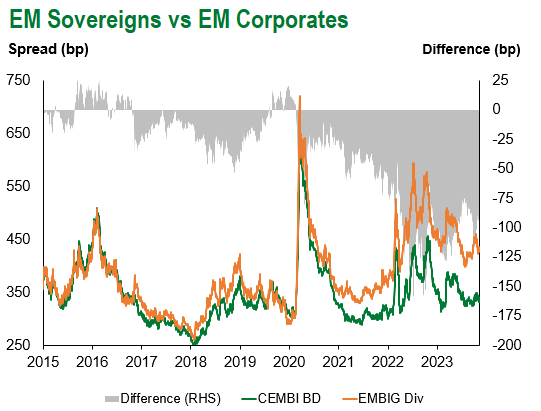
Emerging Markets Flows
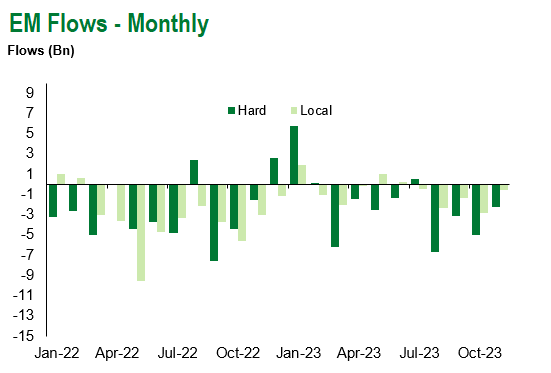
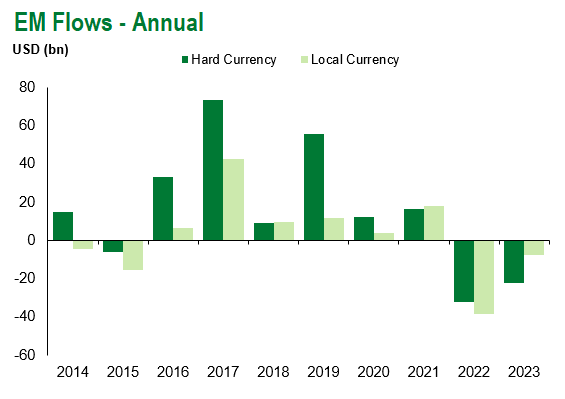
Source for graphs: Bloomberg, JPMorgan, Gramercy. As of November 17, 2023.
For questions, please contact:
Kathryn Exum, CFA ESG, Director, Co-Head of Sovereign Research, [email protected]
Petar Atanasov, Director, Co-Head of Sovereign Research, [email protected]
James Barry, Director, Deputy Portfolio Manager, [email protected]
This document is for informational purposes only. The information presented is not intended to be relied upon as a forecast, research or investment advice, and is not a recommendation, offer or solicitation to buy or sell any securities or to adopt any investment strategy. Gramercy may have current investment positions in the securities or sovereigns mentioned above. The information and opinions contained in this paper are as of the date of initial publication, derived from proprietary and nonproprietary sources deemed by Gramercy to be reliable, are not necessarily all-inclusive and are not guaranteed as to accuracy. This paper may contain “forward-looking” information that is not purely historical in nature. Such information may include, among other things, projections and forecasts. There is no guarantee that any forecasts made will come to pass. Reliance upon information in this paper is at the sole discretion of the reader. You should not rely on this presentation as the basis upon which to make an investment decision. Investment involves risk. There can be no assurance that investment objectives will be achieved. Investors must be prepared to bear the risk of a total loss of their investment. These risks are often heightened for investments in emerging/developing markets or smaller capital markets. International investing involves risks, including risks related to foreign currency, limited liquidity, less government regulation, and the possibility of substantial volatility due to adverse political, economic or other developments. References to any indices are for informational and general comparative purposes only. The performance data of various indices mentioned in this update are updated and released on a periodic basis before finalization. The performance data of various indices presented herein was current as of the date of the presentation. Please refer to data returns of the separate indices if you desire additional or updated information. Indices are unmanaged, and their performance results do not reflect the impact of fees, expenses, or taxes that may be incurred through an investment with Gramercy. Returns for indices assume dividend reinvestment. An investment cannot be made directly in an index. Accordingly, comparing results shown to those of such indices may be of limited use. The information provided herein is neither tax nor legal advice. Investors should speak to their tax professional for specific information regarding their tax situation.
